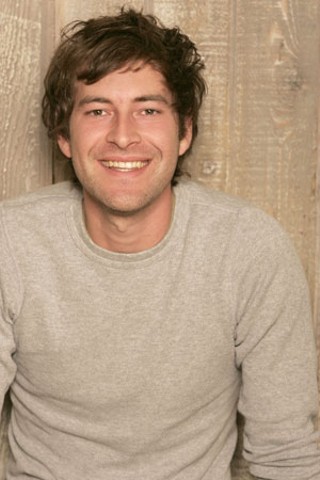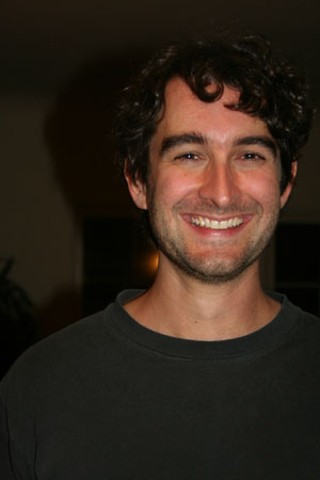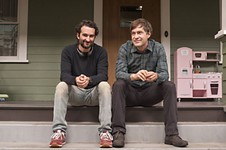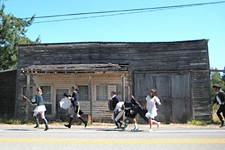Building Buzz, One 'Bag' at a Time
Forget New York and L.A.: The Duplass Brothers are rolling out the red carpet in the River City
By Josh Rosenblatt, Fri., June 6, 2008
Let's start at the beginning.
It's 2002. Brothers and aspiring filmmakers Jay and Mark Duplass are sitting in Jay's small apartment on West Mary Street in South Austin doing nothing. They feel despondent, mopey, self-pitying, nowheresville – as men of a certain disposition in their 20s are inclined to do from time to time. Finally Mark (the younger of the two by three years) decides he's had enough and tells his brother that they're going to make a movie. Right then and right there.
So they come up with an idea about a man, played by Mark, whose fateful decision to re-record the outgoing message on his answering machine results in a seven-minute spiraling soliloquy of self-loathing and desperation. The movie is shot on digital video by Jay in a single 20-minute take, all in that apartment. Amazingly, the exceedingly modest "This Is John" (which Jay calls their "$3 film") goes on to screen at the 2003 Sundance Film Festival and – more amazing still – earns the Duplass Brothers representation by the William Morris Agency, home to Russell Crowe, Denzel Washington, Arnold Schwarzenegger, and dozens of other stars who have probably never worked opposite an answering machine.
Over the next two years, the brothers release two more critically acclaimed shorts and one feature film (2005's The Puffy Chair, which is nominated for two Independent Spirit Awards), each building on their first short's shambolic aesthetic and sense of quiet awkwardness and emotional honesty. They move to New York and then to Los Angeles. Netflix signs on to distribute The Puffy Chair. The brothers make a deal with Universal Studios for a feature script. They start selling pitches to Fox Searchlight Pictures with an eye toward writing scripts for major studios and using the money to fund their own modest little movies.
The press begins taking note, proclaiming the Duplass Brothers shining lights of the new "mumblecore" movement, a style of independent filmmaking characterized by low budgets, nonprofessional actors, improvised dialogue, small crews, handheld cameras, semiautobiographical stories of relational dysfunction, and subtle humor. The Puffy Chair, with its story about the slow and awkward disintegration of a romantic relationship during a road trip from New York to Atlanta, joins Andrew Bujalski's Funny Ha Ha (and later Joe Swanberg's Hannah Takes the Stairs) as one of the bellwethers of this new movement.
Now it's 2008, and the Duplass Brothers are preparing to make their triumphant return to Austin – the sleepy little town that inspired that first sleepy little movie that set their careers in motion. Now darlings of the indie world and burgeoning industry insiders, they've decided to shake off convention and open their newest film, Baghead, not in New York or Los Angeles but in their adopted hometown on the banks of the Colorado River.
Baghead is many things: a drama about people in their 20s and 30s struggling to communicate, a satirical send-up of actors who decide to write movies for themselves after it becomes clear their careers are going nowhere, a classic slasher genre film plucked right out of the 1970s, complete with a cabin in the woods, a homicidal maniac, and exposed breasts. Or maybe Baghead is really just about the increasingly blurry line between movies and reality in our media-saturated age, a study in postmodern self-reflexivity and irony taken to confusing heights: a movie about out-of-work actors getting tormented by a man with a bag over his head making a movie about out-of-work actors getting tormented by a man with a bag over his head.
Despite its horror-film aspirations, Baghead is a Duplass movie through and through. Like The Puffy Chair and shorts "Scrapple" and "The Intervention" before it, its charms lie in its ability to present a lived-in world, populated by believably wayward souls grasping at little bits of language in an effort to understand themselves and others. The Duplass Brothers are masters at creating environments for their actors in which the subtle slights and confusions and disappointments that constitute human relationships are allowed to grow and develop in their own peculiar ways. ("You look like a little toddler," one ingenue coos to the man who pines desperately for her, effectively emasculating him in the process. "You're like my best friend but also like my brother.") Their scripts are mere suggestions, outlines for the actors to work around and through. They don't do rehearsals; improvisation is encouraged. There are no lighting setup changes between takes or adjustments of camera angles. Instead the camera follows the actors as they stumble their way toward the almost imperceptible human moments that Jay and Mark have made their name discovering and bringing to the screen.
After the success of The Puffy Chair, there were plenty of studios and production houses looking to pay for Baghead, but the brothers turned them all down (including one distribution company that offered them a $1 million budget), choosing instead to maintain creative control of their film and shoot it the only way they felt comfortable: with their friends, on the cheap, at their own pace.
"Baghead is about a group of no-name actors," Mark says. "And the concept of putting name actors in a movie that is specifically about no-name actors didn't seem right to us. And the deals we were being offered would have required us to use name actors. That wasn't going to happen. It just wouldn't have worked for the movie.

"Plus, we knew we could make the movie pretty cheap," he continues. "And we knew how we wanted to make it and who we wanted to make it with. The only reason to go to a studio is if you need the studio to make the movie. And we discovered we didn't need anyone else to make this movie."
This kind of dedication to the principles of independence and creative control is a rare thing in today's moviemaking world. (Jay and Mark look to John Cassavettes and John Sayles as inspirations for their careers, two filmmakers who managed to do business with Hollywood without sacrificing personal vision.) Even among many staunchly independent filmmakers, when the opportunity arises to make a movie with a real budget, with real actors, and on real equipment, too often the potential material gains blind them to the perils of studio intervention.
Which is entirely understandable. To paraphrase Groucho Marx: Art is art! ... But then again, money is money!
In other words, it's a thorny and ambiguous issue.
It just doesn't seem to be a thorny and ambiguous issue for the Duplass Brothers.
This is a true story:
Jay and Mark Duplass are called into a movie studio office in Los Angeles to have a meeting with a Hollywood producer. This producer had a good script and might be interested in possibly having hot new indie commodity the Duplass Brothers direct it for him – provided they say the right things, of course. The movie will have a budget of $5 million, or $4,985,000 more than the budget of The Puffy Chair. Jay and Mark like the script. They like the money. They even like the producer.
So, of course, they refuse the offer.
"We're not the right guys to make this movie," they say and proceed to list off names of other semiobscure independent filmmakers they met while living in New York they figure would do a better job than they could. The producer is stunned. His secretary is stunned. His other secretary is stunned. The room goes silent. Most directors spend these meetings begging to be given a chance, bragging about how confident they are, about how they're sure they're going to make a great film and, in the process, make your studio piles of money. The producer's assistant actually says to them, "I'm sorry, did you just say you don't think you'd be right for this movie?" Yup. Meeting over.
Two weeks later, the brothers' agent gets a call from that same producer. This time he has a $12 million movie he wants them to direct. No meeting. No interview. No questions asked. Just an offer.
They refuse that, too.

"The Hollywood studio system is a lot like the middle-school dating scene. You turn them down; they want you more. If producers and studio executives sense that you're desperate for them, they will use that power over you."
Mark says this over the phone from Hawaii, where he and Jay have gone on vacation after shooting the follow-up to Baghead, The Do-Deca-Pentathlon. He's explaining why, exactly, he and his brother turned down a movie with a $12 million budget out of hand, almost whimsically.
"We've sold two features, and we just finished shooting our third," he says, "so we're real comfortable at this point with what we're doing, and we're real specific about how we work. We're never gonna do anything that we're not sure we can do a really good job with. And that's something that people feel when they're dealing with us: They know that we will go our own way and that, if they want to work with us, they'll have to deal with how we work.
"We've seen how people run into Hollywood and then get run out again when they make one bad movie. After The Puffy Chair, we got offered the opportunity to direct some very big, broad comedies that we turned down because if our name is associated with one bad project, we know that we'll get a big paycheck but that we'll be gone next year. That's the way it works."
"From the beginning, we took the Richard Linklater approach," Jay says (referring to the Austin writer/director who's spent his career balancing independent, creative ambitions with the demands of the marketplace), "which is: Get your friends together, and just make a movie, and only worry about the process of making that movie. That's one thing Mark and I have been so true to over the last few years, and especially since we moved to L.A.: Just make stuff your way, and once you've made it, then you come up for air. Because if you start thinking about the industry and how to play that game and what will crowds like and what will the studios like, it becomes a career rather than something you do for yourself. And then you're doomed."
"We want total creative control," Mark says. "That's everything to us. So if things come together for us in the studio system – if the project is right and conditions are right – great, we'll do it. If not, we'll just take one of [our] scripts and make the movie the same way we've been doing it since the beginning: just me and Jay picking up a camera and going from there."
Austin openings are rare things. Even among independent studios and distributors, there's a sense that if you don't open your movie in New York or L.A., your movie never really opens. Doing so implies a certain cowardice, a lack of grand vision. It's like the old Sinatra song, with a twist: If you can't make it in New York, why bother?
So the fact that Baghead is opening in Austin is not a little bit brazen. But the Duplass Brothers aren't interested in being brazen; they're just interested in being the Duplass Brothers: playing to their strengths, doing what they feel comfortable with, and not caring if what they're doing isn't the way things are done.
"Too often with a small movie like Baghead," Marks says, "if you open it in New York or L.A., it never gets a chance to find its legs. We liked the idea of opening up in a place where people might give it a chance and where it actually might play for more than a week or two before it gets knocked out by the next big summer movie."
Jay returns to the idea that the only road map they've had for their success thus far has been their instincts, so they might as well stick with that. "There are so many variables and unknowns in making and distributing and releasing movies that all we try to do is go with our gut and what we believe in and what we love, and then let the cards fall where they fall."
"Austinites are smart," Mark adds, "and they're looking for something different; you've gotta keep them on their toes. For us, Austin is the quintessential movie-watching town, because people there will go to the movies without even knowing what they're going to see, just to see something new. And part of the joy of Baghead is trying to figure out what the hell it actually is. And that requires an open mind and active viewing."
He laughs. "What I'm saying is that Austin viewers are smart enough to recognize how brilliant we are."
Baghead opens exclusively in Austin on Friday, June 13. The Austin Film Society and the Alamo Drafthouse Rolling Roadshow will present an advance, outdoor screening on Thursday, June 12, at Star Hill Ranch (off Hamilton Pool Rd.), with the Duplass Brothers in attendance. For more information or to purchase tickets, visit austinfilm.org or call 512-322-0145.















